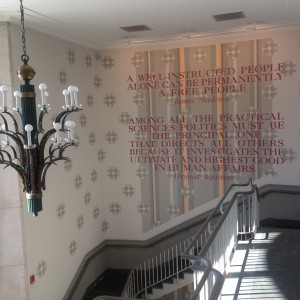As you might remember from my first PCUR post, it can be incredibly rewarding to pursue research outside your comfort zone. If your time at Princeton doesn’t include at least one “just because” class, then you’re missing a few important experiences: first, the chance to expand your intellectual horizons; and second, the ability to navigate diverse styles of independent work. I’ve consciously tried to apply this idea by taking one class in a new department every semester. Yet after shopping six classes this spring, I settled on courses in History, African American studies, Politics, and the Woodrow Wilson School – four departments I’ve definitely been a student in before.

What happened? Well, it’s somewhat obvious: I chose the classes I expected to enjoy. It didn’t hurt that they were all related to, or required by, my major and certificate interests. It also didn’t hurt to read their syllabi and recognize texts and ideas from previous classes. In short, I felt comfortable with my schedule at the end of add/drop period… and it was a strange feeling. As Princeton students, we have access to so many amazing opportunities that it seems wrong to get comfortable in particular academic areas, rather than challenge ourselves in other ways.
I missed something important, though, by framing a conflict between comfortable and challenging classes: there’s no dichotomy between the two. Being comfortable with a general subject area does not mean that subject area won’t raise challenging questions. In fact, the more knowledge you have in a particular subject, the better equipped you are to raise challenging questions yourself. These what if?s are incredible starting points for your independent work. By understanding multiple perspectives on the same issue, you can design a research proposal to uncover answers. You can raise new concerns, re-examine old ones, or apply theories in a new way. Above all, you can be sure that your proposal is a novel one – that the design you’re applying hasn’t been tried before, and the answer to your question will make a real difference. The only way to determine this kind of relevance is to engage with subjects on a deeper level. You shouldn’t be surprised if this means returning to a few departments, or even to the same research topic for a closer look.
At the end of April, it’ll be time to schedule for Fall 2015 courses, and I won’t discard my strategy of consciously trying something new. At the same time, however, I won’t be afraid to try something old – to choose courses in departments I’m familiar with, buildings I know my way around, and research fields I’ve come to understand. I’ll never give up on the idea that Princeton is a time for challenging yourself; but learning from new departments is not the only way to do it. Discovering yourself – by staying true to your confirmed interests – is a challenge equally worth pursuing, and delving further into particular departments is one way to make that happen.
— Melissa Parnagian, Social Sciences Correspondent

